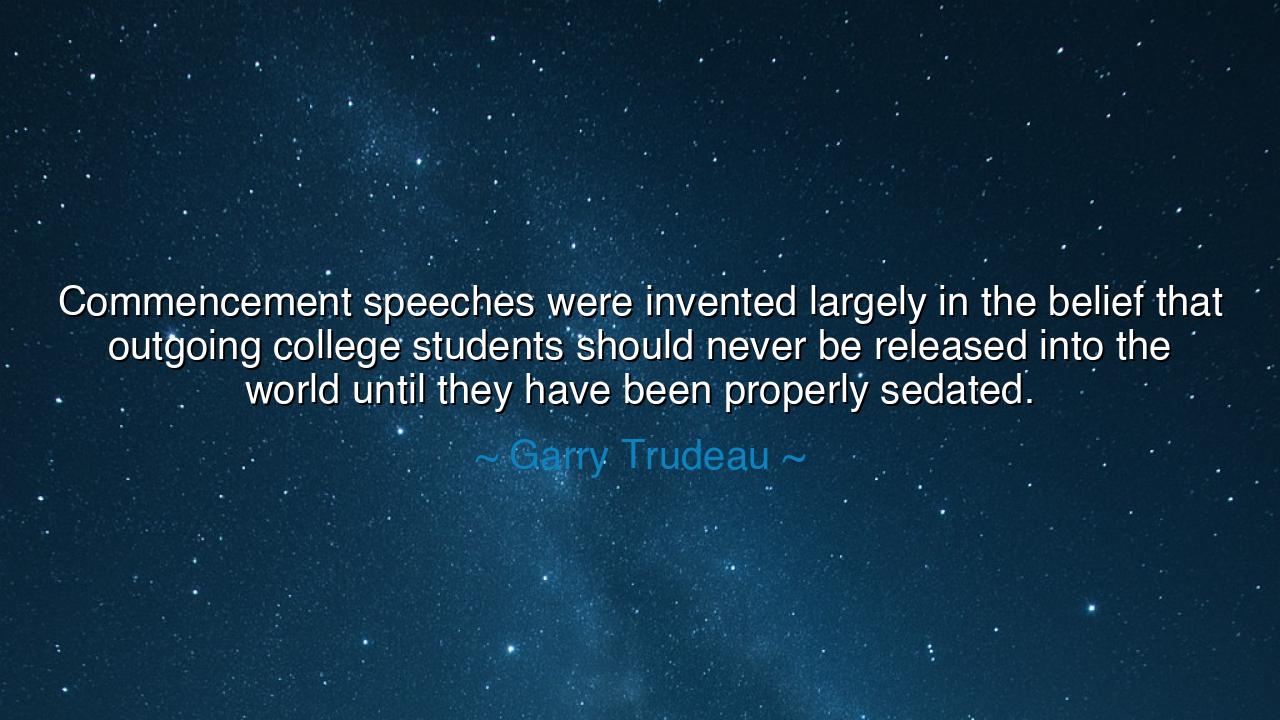
Commencement speeches were invented largely in the belief that
Commencement speeches were invented largely in the belief that outgoing college students should never be released into the world until they have been properly sedated.






The words of Garry Trudeau — “Commencement speeches were invented largely in the belief that outgoing college students should never be released into the world until they have been properly sedated.” — sparkle with wit and irony, yet behind their humor lies a deeper current of truth. Beneath the jest is a commentary on the paradox of graduation, that moment when youthful idealism meets the sobering reality of the world. In his sly tone, Trudeau captures what the ancients might have called the tension between innocence and experience, between the dream of what life could be and the awakening to what it truly is. His words, though playful, are a mirror held up to society — reflecting our habit of soothing the young with ceremony before they enter a world that demands far more than optimism.
In his wisdom disguised as humor, Trudeau, the creator of Doonesbury, reminds us that a commencement speech — that grand ritual of parting words and polished advice — is not merely an address but an anesthetic. It is meant to calm the heart, to soften the shock of transition. For what is graduation if not a birth into a harsher reality? The speech, often filled with platitudes about “changing the world” and “following one’s dreams,” serves, in truth, as a gentle lullaby before the awakening — a balm for those who must soon confront the uncertainties of work, responsibility, and imperfection. Trudeau’s jest is thus a philosopher’s grin: he sees through the glittering surface of the occasion to the trembling humanity beneath it.
In the ancient world, there were no commencement speeches, yet there were farewell teachings — moments when masters sent their students into life’s tempest. Socrates, when departing this world, told his followers not to mourn him but to seek virtue and question everything. The Buddha, before passing into Nirvana, urged his disciples to “be a light unto yourselves.” Neither sedated their listeners; rather, they awakened them. Trudeau’s jest, when seen through this lens, becomes a gentle critique of modernity — of our tendency to comfort instead of challenge, to soothe when we should stir. He reminds us that true education does not end in sedation, but in awakening, in the courage to face the world with open eyes.
There is also tenderness in his humor, for Trudeau does not mock the graduates — he empathizes with them. He understands the vertigo of standing on the edge of youth and gazing into the unknown. The laughter he invokes is not cruel, but compassionate; it is the laughter of one who knows that disillusionment is the beginning of wisdom. To be “properly sedated,” as he says, is to be shielded temporarily from the storm — a brief mercy before the first winds of adulthood begin to blow. And yet, within that mercy lies danger: to stay asleep too long, to remain dulled by comfort, is to miss the call to greatness that lies in hardship.
History gives us examples of those who resisted sedation — who met the world not with false calm but with fiery clarity. Malala Yousafzai, though still a student, faced violence and persecution for seeking education. She was not lulled into docility by comfort or convention; she walked awake into danger for the sake of learning. Likewise, Nelson Mandela, upon leaving prison, did not seek ease but justice, confronting a world steeped in inequity. Both knew what the ancients taught: that life’s purpose is not to remain comfortable, but to remain conscious. The world belongs to those who stay awake even when others sleep.
In this way, Trudeau’s playful remark becomes an exhortation cloaked in irony. He reminds the listener — whether graduate or elder — not to accept the sedation of routine and reassurance. The modern world offers many anesthetics: the constant hum of distraction, the illusion of security, the sweet opiate of conformity. But true life begins when one dares to wake from that sleep — when one accepts that to live consciously is to live courageously. The commencement speech, then, should not be a lullaby, but a trumpet call — not a sedative, but a spark.
So let this be the lesson, O seeker of wisdom: beware the comfort that dulls the soul. When the world offers you easy words and gentle reassurances, listen instead for the voice that challenges you. Do not seek sedation; seek clarity. When you leave the halls of learning, carry not only your degree, but also your capacity to question, to wonder, to strive. For education is not complete until it teaches you to think freely — and thinking freely is the opposite of being sedated.
In the end, Garry Trudeau, with a single stroke of wit, unveils a truth the ancients would have recognized: that laughter, when it reveals truth, is a kind of enlightenment. The purpose of education, and of life itself, is not to make us comfortable, but to make us awake. So rise from the ceremony not lulled by the sweet rhythm of applause, but stirred by the quiet voice of purpose within you. For it is better to enter the world wide-eyed and trembling than to walk into it asleep.






AAdministratorAdministrator
Welcome, honored guests. Please leave a comment, we will respond soon